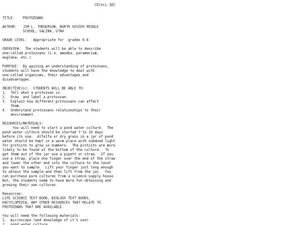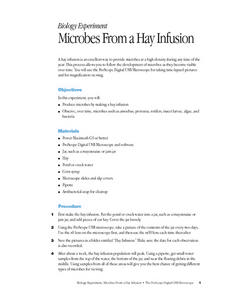Curated OER
Protozoans
In this protozoans instructional activity, students observe pond water using a microscope to identify the four classes of single-celled organisms including sarcodines, ciliates, flagellates and sporozoans.
Curated OER
Protozoans
Students examine protozoans and their advantages and disadvantages. In this chemistry lesson students explain what a protozoan is then draw and label one.
Curated OER
Protists and Fungi
Here is an outstanding presentation on protista. It lists general characteristics, and then moves on to describing three different categories of protists. For each, viewers learn physical features, behaviors, and means of reproduction....
Curated OER
Diversity of Modern Life
Convey classification to your amateur biologists with this bright and bold presentation. After you introduce each kingdom, query your viewers with the included reinforcement questions. Since there are no photos of the different...
Curated OER
Comparing the Amoeba to Paramecium
This laboratory activity is valuable practice in comparing features of different organisms. You could use it to introduce junior biologists to protozoans. The materials and procudures for the learners are simple, and analysis questions...
Curated OER
Protists
With this collection of slides, future biologists get to view photographs of protozoans from different phyla. Interspersed with the photos are bullet-style notes listing characteristics of each group. Unfortunately, most of the pictures...
Curated OER
Microbes From a Hay Infusion
Middle schoolers observe, over time, microbes such as amoebas, protozoa, rotifers and insect larva. They create a hay infusion culture using pond water then sample and record organisms found over a two week period.
Curated OER
Examining Pond Life
Students collect and examine microscopic life from a local pond. In this biology lesson, students examine local pond water, searching for protozoa, with the use of a microscope. Students identify the various life forms in their slides...
Curated OER
PARAMECIUM RESPONSES TO STIMIULI
Students design the test they use to examine, how the paramecium move, feed, and react to different types of stimuli such as a drop of vinegar. They conduct a lab experiment using a microscope.
Curated OER
The Physiological Tolerance of Two Species of Protozoans
Students examine the differences in pH tolerance between the two species and relate these differences to their respective niches.
Curated OER
Endosymbiosis: A Friend Within
Students research the ecological principle of symbiosis. Using a microscope, students observe the relationship of mutualism between termites and flagellates. Students examine a live termite and protozoans. They discuss the principles...
Curated OER
Species Diversity and Phylogeny
Students explore the classification system of organisms: taxonomy. They examine prepared slides of Protozoans and record information on a Taxonomy Recording Sheet. Two additional classifying activities are also included in this lesson...
Curated OER
Composting in Schools: Observing Compost Microorganisms
Students explore composting. In this composting lesson, students use compound microscopes to observe the microbial communities in compost. Observations and documentation of changes will occur over the course of several weeks.
Curated OER
Comparative Embryology Using Japanese Medaka Fish
Students conduct an experiment to control the breeding of Japanese Medaka fish. They collect the fertilized eggs and view and record the fish's embryological development daily to compare the stages to human development.















